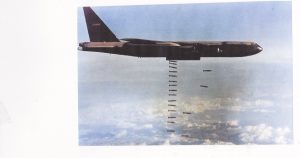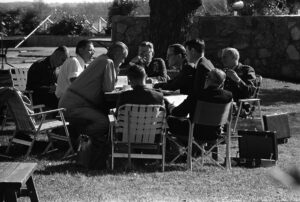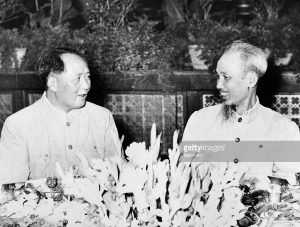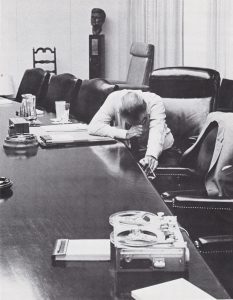If you’re a politician and you can’t tell when you walk into a room who’s for you and who’s against you, then you’re in the wrong line of work.
∼Lyndon B Johnson
Lyndon Baines Johnson (LBJ) was known as a masterful, and at times brutal politician. As he took ownership of the Vietnam War, he unleashed the infamous LBJ carrot and stick assault, (known as “the Johnson treatment”) alternately cajoling then bullying hesitant and timid senators, congressmen and constituents on both sides of the aisle. Whenever he got a sliver of support for the U.S.’s ever increasing role in the war in Southeast Asia, he chalked it up as a victory.
In spite of strong resistance from the North Vietnamese and the Vietcong, the ever-growing peace movement at home, and hand wringing politicians at all levels, Johnson was convinced the war could be won and threw more men and firepower at it in each passing month.
The international community wasn’t too inspired by America’s muddle in Vietnam either. As the war dragged on, peace rallies and riots were seen in many nations across the globe. America’s two staunchest allies, Canada and Great Britain declined direct involvement, and provided only tepid backing on the world stage. France, the nation responsible for creating the mess in the first place, advised the U.S. to get out of Vietnam; after dragging them into it.
Help is on the Way
Hoping to establish legitimacy and moral support for the war, Johnson reached out to U.S. allies, despite the fact that most were lukewarm on the venture in Southeast Asia. In the mid-sixties, Johnson and defense chief Robert McNamara cooked up the “All Nations” program. Using the same carrot and stick tactic that he employed on reluctant senators and congressmen, he went after support from many allies. Despite all the negativity and opposition to the war, Johnson’s impressive skills at shmoozing and arm twisting garnered several participants.
Loyal U.S. ally South Korea was the single largest contributor to the war effort, second only to the U.S. itself. They provided some 335,000 Soldiers, Marines, Airmen and Sailors, of which approximately 5,500 were killed in action. The ROK’s, as the South Korean troops were called, were known for their loyalty and ferocity and contributed much to the U.S. effort.
(Ref earlier blog articles on this website; The ROKs; Republic of Korea Soldiers in Vietnam, and Swimming with the ROKs.)
South Korea initially resisted being pulled into the quagmire. Johnson had to repeatedly remind them of the American effort to save them from the communists some years earlier. And Johnson was a good “reminder”. When it was apparent they would have to pony up, South Korea exacted significant monetary compensation for each troop it sent; as well as favorable treatment for South Korean contractors regarding war materials.
Thailand also required the LBJ “punch & kiss” therapy. The two nations eventually developed agreements which allowed U.S. airbases to be placed on their soil, where the huge B-52 bombers could take off and land with ample runway space and maintenance capabilities. Thailand was also given special treatment for USO contractors.
The Philippines and Taiwan were also subjected to LBJ’s pressure tactics to contribute. The Philippine’s allowed itself to be seduced, shrewdly bending the U.S over for huge financial grants and contracts regarding the Subic Bay Naval facility and Clark Air Base facility. Taiwan on a lesser scale, siphoned millions off Uncle Sam for a future U.S. Air, Naval and Marine presence there.
Two dependable U.S. allies provided Johnson with (a well needed) easy sell regarding recruitment to the war effort, willingly providing men and materials; and free of charge no less. Both Australia and New Zealand ponied up men, materials and more importantly a skilled background in guerilla warfare.
From 1963 to 1966 Indonesia and Malaysia fought a war over Malaysia’s break away move to create an independent state. Backing Malaysia, Australia and New Zealand both provided military assistance, including troops and materials. Their learned experience fighting in a guerilla type jungle war was invaluable to the American effort in Vietnam. And while their war losses in Vietnam were substantially lower than that those of South Korea, their contribution was significant.
North Vietnam Also had Help
From early on in the war, the U.S.S.R. and Red China bankrolled the North Vietnamese, however other than money and war materials, they never stuck their toe in much further. If Ho Chi Minh had possessed some of LBJ’s persuasive powers, perhaps the U.S.S.R. and China would have jumped in with both feet.
Johnson’s Undoing
Although the U.S. military repeatedly bloodied the North Vietnamese and Viet Cong, growing negative sentiment at both home and abroad made the war extremely unpopular, ultimately leading to Johnson’s stunning abdication before the 1968 presidential election:
“I shall not seek, nor will I accept, the nomination of my party for another term as your president.”
The rest, as they say, is history.
***
You are welcome to share this article, in its entirety, crediting Joe as the author. Copyright protected, all rights reserved © Joe Campolo Jr



